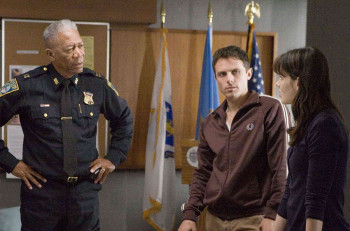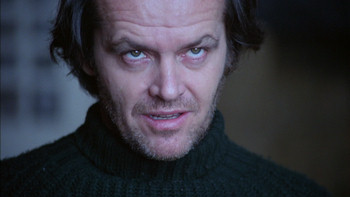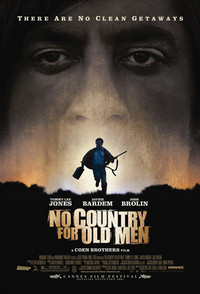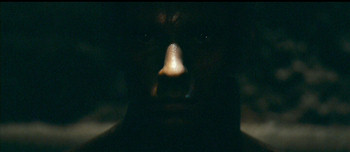Twitter Review: The Girl with the Dragon Tattoo
‘Dragon Tattoo’ has a damaged, sharp heroine; compelling depravity; a fair mystery; and no fat. But it’s oddly amorphous and fixated on rape
‘Dragon Tattoo’ has a damaged, sharp heroine; compelling depravity; a fair mystery; and no fat. But it’s oddly amorphous and fixated on rape
 When I say that the filmed version of Watchmen and the horror remake Quarantine are faithful to the point of tedium, I intend that largely as a compliment. Great talent, care, time, and money have been spent not fixing what ain’t broke. Considered separate from their sources, both movies work. But they’re damned depressing.
When I say that the filmed version of Watchmen and the horror remake Quarantine are faithful to the point of tedium, I intend that largely as a compliment. Great talent, care, time, and money have been spent not fixing what ain’t broke. Considered separate from their sources, both movies work. But they’re damned depressing.
 One thing you might notice picking up Daniel Woodrell’s novel Winter’s Bone is how thin it is – less than 200 pages. And when you start reading, you might be struck that it’s been carved incredibly lean. While relatively plainspoken, the sentences are dense, with a mix of dialect from the Ozarks and artfully turned idioms that feel instantly right. One has to sip Woodrell’s language. “I do like to make it apparent to the reader that you need to probably read everything,” Woodrell said in a phone interview in April. “‘I won’t put in any flab, but you have to read what’s here’ is kind of my deal with the reader. … Pay attention to the sentences.”
One thing you might notice picking up Daniel Woodrell’s novel Winter’s Bone is how thin it is – less than 200 pages. And when you start reading, you might be struck that it’s been carved incredibly lean. While relatively plainspoken, the sentences are dense, with a mix of dialect from the Ozarks and artfully turned idioms that feel instantly right. One has to sip Woodrell’s language. “I do like to make it apparent to the reader that you need to probably read everything,” Woodrell said in a phone interview in April. “‘I won’t put in any flab, but you have to read what’s here’ is kind of my deal with the reader. … Pay attention to the sentences.”
Aside from canonizing its subject – especially in the excruciating bookends – ‘Charlie Wilson’s War’ is crackling, sharp, and outraged fun
Based on a memoir, the facile, impatient ‘An Education’ is incredible, and glosses over its most compelling element: the facilitating family
‘Fantastic Mr Fox’ balances Dahl’s aggressive oddity with Anderson’s preciousness; given Wes’ recent missteps, animation is a promising path
 Roughly halfway into Gone Baby Gone, Ben Affleck’s directorial debut, the movie is finished. The plot involving a kidnapped youth has been apparently, tragically resolved. But the movie still has an hour left, a clockwatcher will tell you. And even if you’re not a person regularly calculating how the anticipated remaining X plot will unfold in the remaining Y minutes, you know that there’s plenty left to come.
Roughly halfway into Gone Baby Gone, Ben Affleck’s directorial debut, the movie is finished. The plot involving a kidnapped youth has been apparently, tragically resolved. But the movie still has an hour left, a clockwatcher will tell you. And even if you’re not a person regularly calculating how the anticipated remaining X plot will unfold in the remaining Y minutes, you know that there’s plenty left to come.
 The turning point in The Shining comes when Jack Torrance encounters a woman in Room 237. Naked, lithe, and beautiful, she gets out of the bathtub and wordlessly approaches Jack. They kiss, but when Jack looks in the mirror, his arms are embracing a decaying old woman, flabby and with patches of her skin missing. It’s not your typical turning point. A heretofore pedestrian movie doesn’t begin to redeem itself, and a previously engaging work doesn’t go off the rails. Instead, things start to get muddled.
The turning point in The Shining comes when Jack Torrance encounters a woman in Room 237. Naked, lithe, and beautiful, she gets out of the bathtub and wordlessly approaches Jack. They kiss, but when Jack looks in the mirror, his arms are embracing a decaying old woman, flabby and with patches of her skin missing. It’s not your typical turning point. A heretofore pedestrian movie doesn’t begin to redeem itself, and a previously engaging work doesn’t go off the rails. Instead, things start to get muddled.
 My first thought after watching Joel and Ethan Coen’s No Country for Old Men – amid groans from others in the theater – was that I understood why some people hate it.
My first thought after watching Joel and Ethan Coen’s No Country for Old Men – amid groans from others in the theater – was that I understood why some people hate it.
 The contradictions of director/co-writer/composer Tom Tykwer’s Perfume: The Story of a Murderer start in the title, with the onomatopoeic softness and ether of a single word paired with a morbid, blunt descriptive subtitle. Both components are drawn from the novel by Patrick Süskind, but the associations that pile up and pull at each other during the movie’s opening scenes are equally Tykwer’s, cinematic and lovingly ambiguous.
The contradictions of director/co-writer/composer Tom Tykwer’s Perfume: The Story of a Murderer start in the title, with the onomatopoeic softness and ether of a single word paired with a morbid, blunt descriptive subtitle. Both components are drawn from the novel by Patrick Süskind, but the associations that pile up and pull at each other during the movie’s opening scenes are equally Tykwer’s, cinematic and lovingly ambiguous.